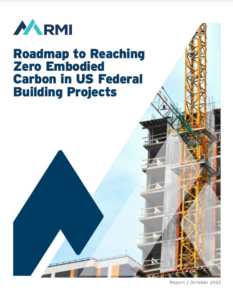Full Title: Roadmap to Reaching Zero Embodied Carbon in Federal Building Projects
Author(s): Anish Tilak, Connor Usry, Victor Olgyay
Publisher(s): Rocky Mountain Institute
Publication Date: October 14, 2022
Full Text: Download Resource
Description (excerpt):
Within the walls, floors, and foundations of our buildings is an often-overlooked source of climate pollution commonly referred to as embodied carbon — the millions of tons of carbon emitted during the extraction, manufacturing, transport, construction, and end-of-life disposal of the materials that surround us. Public and private sector stakeholders must act now to establish pathways to decarbonize building and infrastructure design and construction, including reducing emissions from building material supply chains. The US federal government is the largest consumer in the world, spending more than $650 billion on products and services each year. The procurement of materials for its large portfolio of buildings (2.8 billion square feet) presents a ripe opportunity for agencies to dramatically reduce embodied carbon emissions and meet President Joe Biden’s ambitious goal of achieving net-zero greenhouse gas (GHG) emissions from federal procurement by 2050. The passage of the Inflation Reduction Act, which contains funding to support low-carbon public procurement and industrial decarbonization, provides valuable momentum toward achieving this vision.
In this report, RMI provides a roadmap for how the US federal government can reduce embodied carbon emissions from public building projects over the next 30 years and outlines strategies for agencies to facilitate the broader movement to decarbonize the building industry and industrial supply chains. The core strategies underpinning the roadmap to zero embodied carbon by 2050 are:
- 1) A robust Buy Clean procurement program with emissions standards for major building materials and a clear path to increasing the stringency of these targets.
- 2) Procurement policies that incentivize or require the purchasing of advanced, deeply decarbonized materials for federal projects.
- 3) Whole-project embodied carbon performance standards to enable holistic benchmarking of federal building projects.
- 4) A climate-smart portfolio planning framework that captures the embodied carbon value of preservation, renovation, and adaptive reuse of existing buildings.
